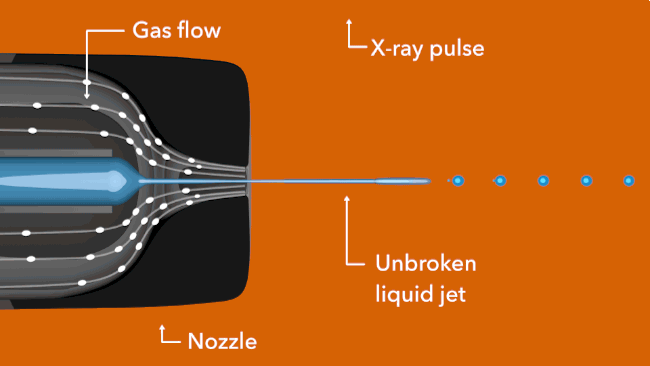Gas Dynamic Virtual Nozzles
Gas Dynamic Virtual Nozzles (GDVN), injectors producing steady liquid microjet, are the standard device for Serial Femtosecond Crystallography (SFX) experiments.
How it works

Steady jetting is obtained by utilizing a flow-focusing configuration, consisting of a sample feeding capillary positioned in front of a gas aperture ice. The outer sheath gas, typically helium, accelerates the sample meniscus into a smaller liquid jet diameter than that of a Rayleigh jet from the sample capillary.
The flow-focusing and accelerating effect in the liquid jet is achieved due to the presence of the pressure gradient induced by the surrounding gas stream. The gas focusing or “lens” effect is created by the properly shaped converging gas aperture.
GDVNs generate a liquid jet of micron-scale 1microns diameter, with a jet 10-100 m/s, and typic a typical flow rate of 10-100 A small and steady jet can exist over a short distance, typically 100-500 microns, and eventually breaks up into droplets due to Rayleigh-Plateau instability.

Where GDVNs are used
GDVN jets can be used at atmospheric pressure as well as in a vacuum environment. Typically, GDVNs are used in Serial Femtosecond Crystallography (SFX) experiments and in Wide/Small Angle Scattering (WAXS/SAXS) experiments. Flow rates and jet speeds can be optimized in a wide range in accordance with the experiment parameters such as beam diameter and X-ray pulse repetition rate.
GDVNs are also widely used in time-resolved structural biology experiments. To improve and extend the capability of classic GDVN for time-resolved crystallography application, different types of mixing devices and Double Flow Focusing Nozzles (DFFN) were developed and successfully used in 2021.
Currently, LCLS uses 3D printed GDVNs, DFFNs, and mixers. Glass nozzles and Chips are available for specific experimental conditions as well.

Running parameters: GDVN vs DFFN
| GDVN | DFFN | |
|---|---|---|
| Sample Flow Rate | 20-100 µL/min | 1-50 µL/min |
| Substrate Flow Rate | - | 10-100 µL/min |
| Jet Speed | 10-100 m/s | 10-100 m/s |
| Jet Structure/Diameter | Cylindrical jet | Coaxial cylindrical jet |
Pros and Cons of Gas Dynamic Virtual Nozzles
| Nozzle Type | Jet Features | Sample Properties | Pros | Cons |
|---|---|---|---|---|
| GDVN | Cylindrical jet, 20-100 µL/min flow rate | Low viscosity liquid | • Low background • Compatible with a high repetition rate | • High sample consumption • Clogging issues |
| Mixer plus GDVN | Cylindrical jet | Two low miscible liquids | • Enables time-resolved experiments | • Mixing/dilution time can be limited by geometry, typically 0.003-10 s. |
| DFFN | Coaxial cylindrical jet | Two immiscible (DFFN) or miscible (Mix-and-inject) liquids | • Enables time-resolved experiments • Reduces sample consumption | • Typically, high total flow rate, above 100 µL/min • Mixing time 0.003-1 s. |
| Chip nozzles, DFFN | Cylindrical or sheet jet | Not available for crystallography | • Repeatable parameters | • High flow rate, above 50 µL/min |
